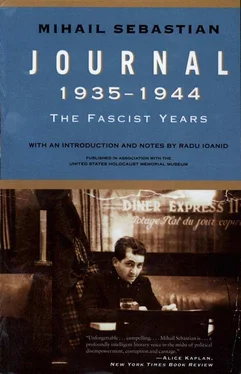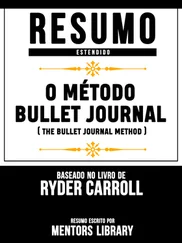The war in Russia really is total. You see very few men. Women have replaced them everywhere. Ugly, badly dressed women, naively eager to flirt (lipstick, clumsy and pretentious hairdos). Life is terribly hard (four or five people live in one room), and terribly expensive (130 rubles for a bar of soap). A mixture of arrogance and inferiority complex. They are aware of their great victories but at the same time fear they are not being shown sufficient respect. This upsets them.
The Romanian delegations were first summoned by Molotov at eleven in the evening. Then they were told to report an hour earlier: at ten o’clock. When they entered the Kremlin at ten sharp, a mighty cannonade began. They asked what it was and were told they were salvos for the capture of Bucharest.
Then the door opened and they went into Molotov’s office.
The discussions did not change a comma in the prepared text of the armistice agreement. The objections fell one after the other — there was no point. From time to time Molotov asked: What were you looking for in Stalingrad?
I didn’t know that Vişoianu played such a major role in organizing the plot. On the night he left for Cairo, the King gave him his word that he would carry out the coup d’état as soon as he heard from Cairo that the time had arrived.
The amazing thing is that such an operation, prepared over a long period of time with emissaries and written correspondence, could take place right under the noses of Antonescu’s people and Killinger.
Probably there was a kind of paralysis of will, a disappearance of self-protective reflexes, which usually sets in when a regime is on its last legs.
Another long conversation with Vivi [Vişoianu], this time alone. He tells me that he doesn’t dare express all the bitterness with which he has returned from Moscow.
He believes in freedom — but there is no freedom there. People are terribly afraid to speak their mind, to say clearly either yes or no. There can be no doubt that Romania must go along with the Soviets, but it is not easy to get through to them. People there hide away and cannot be found. The material and intellectual level is low. Great ignorance, and great poverty.
I tend to agree with Vişoianu — but then stop myself.
He is a Westerner, a man for whom comfort, well-being, good manners, and politeness are ingrained habits, necessities of life. But the regime in Russia is for workers and peasants, for people who are only now learning to write, to wash, to eat properly — tens of millions who are rising with difficulty toward an elementary level of civilization. It is a world without refinement. All the things that have been dear to me — discretion, moral elegance, irony, respect for ideas, an aesthetic sense of life— are impossible in such a world, which has to solve the immediate problems of hunger and cold.
We may be deceiving ourselves when we think that the broad masses share our same thirst for freedom. We need Montaigne’s freedom: an intellectual freedom that defends its solitude. Peasants and workers — the “crowd”—have simpler and more powerful demands.
Yesterday evening there was a Soviet music-hall show ( estrada , the Russians call it) at the Alhambra. It was a wretched front-line troupe, with a ham-handed pianist, two Circassian fairground dancers, a couple of athletic dancers, an awkward young actor (who recited Pushkin, immediately followed by some anecdotal verse), and finally a comic actress who spoke in monologues. Nor should I forget a tenor in a brand-new tuxedo, which he had probably bought off the rack in Bucharest and wore with a touching lack of grace.
It was all quite wretched, but not without a certain warmth. I still can’t help feeling that there is something miraculous in the presence of these troops, so candid in their wildness. There is also something dreamlike in it. Around me were soldiers and officers with all kinds of faces (a Mongol, a Tatar, a Jewish major with a wonderfully kind expression, a nearsighted young soldier looking somehow melancholy behind his glasses). I laughed with them. I applauded with them.
Still the same disjointed life. The lack of a stable home disorganizes me. I have no practical ability; I am par excellence the type of person who “can’t sort things out for himself.” I am, in the worst sense of the word, a “poet.” I don’t know how to talk with the landlord, or quarrel with a neighbor who is bothering me, or arrange something at the local police station. All I want is to be left in peace. I miss opportunities, I give in, I swallow things, just to be left in peace. It is absurd and very harmful. At thirty-seven years of age, I am as helpless as a child.
I am somehow installed in the Mehedin^ household. All sorts of problems, but at least I have a room from which no one threatens to evict me (for the time being).
The house at Strada Antim is being repaired. I don’t know when it will be ready, nor do I know if and when we’ll be able to return there. Meanwhile I want to calm down and wait, with less nervous fretting.
I am terribly tired. I don’t know why. Obviously my health has been deeply affected. I sleep badly, have dizzy spells, and look wretched. I ought to take more care of myself, but I have never known how to do that.
Nothing new at the fronts, nothing new in internal politics. The German resistance is desperate but still firm. And here the old reactionary Romanian state is putting up a dull, stubborn resistance.
It’s not serious, of course. They will all go to the devil: both the Germans at the front and the Legionaries inside the country.
Meanwhile I feel a little disgust for the eternal Romania in which nothing ever changes.
Camil Petrescu read me a couple of articles in which he has taken sides with “the Left,” one violendy attacking the Germans, the other attacking Gide. Like hell! Didn’t he have any time to write before the 23rd of August?
I advised him to take it easy. For five years Camil has been exculpating himself and joining something new.
Yesterday evening, as they returned from three shows at the theatre, Nora and Mircea were attacked by a Russian soldier. With his revolver at Nora’s head, he took from them a hundred thousand lei — and a watch.
He had to run into them, of all people. There are thousands of people who might have deserved something like that (Ghiolu, Kazazian. .). Why Nora and Mircea?
Always tired, without any normal explanation. Am I really ill?
I live in a constant state of nervous tension, unable to regain my equilibrium. The house is largely to blame. But it is mostly my own fault, because I let myself go too easily, too quickly.
Life keeps passing me by. Some people, in these new conditions, at least try to find a position for themselves (Gruber, Comşa). But for me, nothing whatever has changed. I have some money left over from Steaua fără nume, and I’ll probably get another two or three thousand lei from the Baraşeum. Without that, I’d be really up against it. I have no position — nor do I see any prospects. Money as such (whether it’s 100, 300, or 500,000 lei) doesn’t mean anything at all. We are in the grip of inflation and keep falling down and down. What counts, then, is not money but the capacity to work, to keep your head above water, to be part of some institution.
But I am always alone.
The government went into crisis a few days ago, though there have not been any resignations. The stubbornness or inertia of the old state (if not its manifestly reactionary ambition) will have to be abandoned. The Liberals and the National Peasants are caught between total disappearance and relegation to the background of political life. The Left is throwing itself into the attack. For the moment there is no question of a Communist revolution. But if democracy is to become a reality in Romania, deeply radical changes will have to be urgently introduced.
Читать дальше











